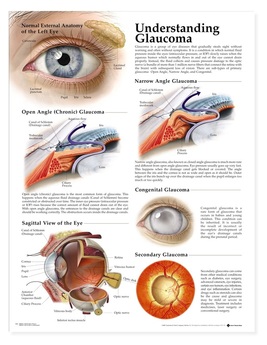 Glaucoma is the name given to a group of conditions in which the optic nerve suffers a characteristic form of damage at the back of the eye which is often associated with a raised level of intraocular pressure. The optic nerve damage causes patchy loss of vision that varies in severity from patient to patient. Without treatment, the loss of vision usually gets worse over the course of many months or several years. The loss of vision in glaucoma is permanent, but with early treatment, the damage to vision can be minimised. Most patients with glaucoma are not aware of problems with their vision. This is because the central vision (for reading and recognising people) is only affected when glaucoma has advanced to a late stage. Even when central vision is still good, glaucoma may affect the vision needed for driving and getting about (for instance, seeing steps). Blindness from glaucoma is rare. If blindness does occur, it is usually because the glaucoma is already advanced when it is first diagnosed, because the eye pressure has not responded well to treatment or because patients have not taken their drops regularly. For most glaucoma patients, the main effect of the condition is the inconvenience of taking eye drops. Are some people at increased risk of developing glaucoma? Yes, there are several risk factors which make the onset of glaucoma more likely and they tend to be cumulative in their effect. Age Primary open angle glaucoma (POAG) becomes much more common with increasing age. It is uncommon below the age of 40, but the number of people with the condition rises from about 2 per cent of people over the age of 40 and doubles for those over the age of 80. Race People of African-Caribbean origin have about a four times increased risk of POAG when compared with those of a European origin. The condition also tends to come on at an earlier age and be more severe. Regular testing is therefore vital if visual impairment is to be avoided. People of Asian origin are at an increased risk of developing primary angle closure glaucoma (PACG). Family history There is at least a four times increased risk of developing glaucoma if you have a close blood relative with the condition (father, mother, brother, sister or child) which is why early detection is so important as treatment is more effective when the glaucoma is detected early. Eye examinations are funded by the NHS for such people from the age of 40 years, but an earlier test is recommended, especially if you also fall into one of the other risk categories. Regular eye health checks should include the three glaucoma tests: ophthalmoscopy, tonometry and perimetry. If you have glaucoma, don’t forget to tell your relatives about the condition and the need for them to be tested. Short sight People with severe myopia (very short sight) are known to be at increased risk of developing glaucoma, and should ensure that they are regularly tested for glaucoma. Long sight Long sighted people are known to be at increased risk of developing angle closure. Diabetes People with diabetes may be at increased risk of developing glaucoma, although it is not known whether there is a direct link between the two conditions. However, all people with diabetes should have regular routine eye examinations for diabetic eye disease, however, this does not include comprehensive tests for glaucoma, but these can usually be requested at the same time. To book an appointment please call us 01268 544646 and we will be happy to help.
0 Comments
Your comment will be posted after it is approved.
Leave a Reply. |
Author:
|
|
Templeman Opticians -Laindon,
Danacre, Laindon, Essex. SS15 5PS |
© Copyright Templeman Opticians Laindon 2023
|

 RSS Feed
RSS Feed

